MMBN4 Translation Observations
So if you didn't know, during my replay of the Battle Network series this year, I found myself noticing lots of translation goofiness. Which, I mean, I knew that.
When I idly looked into editing the text in BN3, I found out someone had just made a program that handled text insertion for all the games, and proceeded to go maybe a little overboard. I've since released GBA patches and Legacy Collection mods revising the translation for BN2, BN3, and now, most momentously, BN4! (And that might be all I do. But who knows.)
It's well-known, of course, but yeah: the original translation for Battle Network 4 is quite a mess, even moreso than the messy translations of all the other BN games. (BN6 is when they finally seemed to pull things together, but even that has its errors.) Yet in the course of revising the whole thing, I couldn't help but pick up on some trends, and reasons why things might have ended up the way they did. So let's go into them.
——
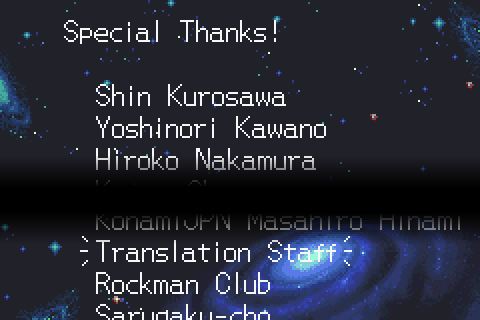
For reference, BN1-3 all credit Bowne Global Solutions with the translation. Meanwhile, BN4's credits just put "Translation Staff" in Special Thanks, making it sound like an internal team. (BN5 and BN6 credit the localizers by name - in fact, one of the localizers on BN6 is a name I recognized from her work on Ace Attorney, Janet Hsu.)
That's basically all I have to say about that, but it's worth pointing out, as there seemingly was a shift there, which may have reset some of the knowledge and experience built up from prior games. (Of course, it may be foolish to think that BN1-3 being done by the same company necessarily means it was mostly the same people who built up experience. Still, I do generally feel that the translation quality slowly increased from BN1 to BN3.)
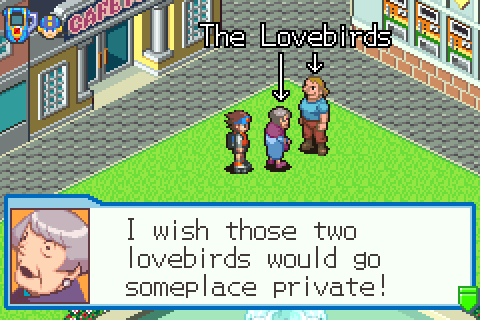
Now first, rather than a BN4-exclusive thing, I'd like to mention a perennial problem across the entire series (and really, game translations in general): translators lacking in-game context, and the resulting issues either not getting found in QA, or no one bothering to fix them. It often manifests in lots of little things like singular-versus-plural issues, since Japanese often does not make that clear. And in the example here, there's just been a total misunderstanding of the characters involved.
Battle Network is full of incidental NPC dialogue with its own tiny subplots, which can sometimes only be fully understood if you not only see things in-game, but come back to check on NPCs whenever the plot progresses in a way that invites new dialogue. (NPCs who change areas are particularly tricky - since the text data is organized by area, you pretty much have to be checking with everybody in-game to make the connection that they're the same person when they use a generic design.) So those tend to get fumbled a bit, if not a lot, when the translators are given far less context than that.
![Two dialogue boxes of a businessman saying ''Hey! It's me, the [line break] chief of the Electo- [line break] pia NetBattler Asso-'' The first box is modified to make the font have a fixed width of 8 pixels (with faint grid lines showing the 8-pixel spaces they fit into), and the text goes mostly up to the edge of the box. The second box shows how it actually appears in game with the variable-width font, and it's clear there's enough extra room that the text does not need to be broken up in this way.](./graphics/mmbn4/03Hyphens.png)
With that out of the way, here's a really big thing that impacted BN4 specifically: The translators were definitely under the impression the game didn't, or wouldn't, have a variable-width font, instead working within the prior games' fixed character limits of 20 characters per line. The above image demonstrates their expectation versus the in-game reality.
(Quick aside to go into the exact limitations in BN1-3: You could safely put up to 20 characters on each of the three lines. A 21st character would fit on a line, but if it was on the third line, it would be partially covered by the arrow icon. Additionally, there was a hard limit of 60 characters total per box; characters past 60 would turn into glitched graphics due to how it was implemented. For this reason, the original translators seemed to almost always stay within 20 to be safe.)
For messages in all-caps, like the Mr. Progs', these limits basically still hold true for BN4. But the reality is that most lowercase letters are 7 pixels wide instead of the usual 8, with a few even being 6 pixels. Thus, most lines can fit several more characters than 20, which really adds up, and there's no hard limit on total character count either. It means many awkward word breaks they did can just be unbroken and fit exactly as-is. It's entirely possible they only implemented the variable-width font late into the project; at any rate, the script itself certainly didn't get to benefit from it. (Until my revision, where I greatly appreciated it.)
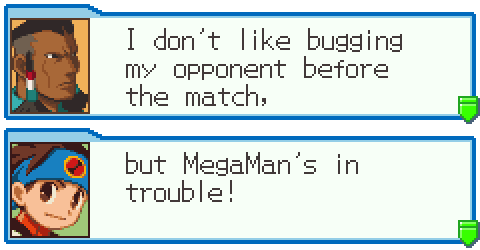
There are many cases where they clearly couldn't see or just didn't look at who was speaking, or realize where the divides between different sets of dialogue were. Pictured is one of the funniest instances of this, where Raoul starts Lan's sentence. (Also, later in this scene, Lan asks himself - and answers, incorrectly - if MegaMan was "fighting a viruses" before he collapsed.) This type of speaker mistake happens a few times in BN5 as well, so they didn't learn any lessons there.
Also fairly common is misreading dialogue for saying "no" to a choice, because it generally comes before the "yes" branch text. And when giving out flyers for Higsby's in the NumberMan scenario, the rather obscure branch for "out of flyers (due to throwing the rest away), and this person wasn't given one" comes before the "this person was given a flyer" branch, causing the former to often be treated as "gave flyer" text and mistranslated accordingly.
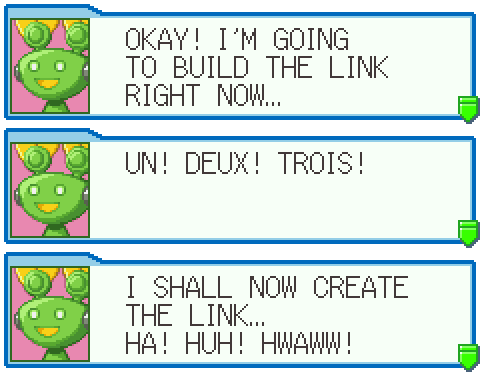
Some sets of dialogue appear multiple times in different archives and got translated a second or third time differently. (Note that there's also a lot of duplicated text for L Button dialogue, since it's split up by current map, but those generally did stay consistent, so that's not what I'm talking about.) This is because most maps in BN4 have their NPC text split up into three archives for the three "sections" of the game (as tied to the tournaments), even if certain NPCs stay the same in all three, and a lot of one-off Comps never actually change at all.
These archives are literally one after another in the data, so likely they were split up between multiple translators in such a way that this could happen on numerous occasions. This is supported by the quality of one translation of the same text often being markedly better or taking a totally different approach; in the example above, the Japanese was in fact "un deux trois," but the second translation seemingly read it as grunts.
It's kind of a nothing statement to be like "this game had multiple translators," because it's no surprise a game of this size would. But you really can feel the differences in translation skill and style in places, which is not... generally desirable. For as many parts as I basically threw out to retranslate from scratch in my revision, there were plenty of parts that were perfectly competent too (particularly if you account for the apparent circumstances) - although all were negatively affected by the overly-restrictive character limit.
One particular quirk I noticed is that one or more of the translators would translate longer dialogues in one whole chunk, wrap the text, and then simply allocate those lines to boxes (not even necessarily using all three lines) no matter how unnatural this way of splitting them up felt. Sometimes they'd stretch it out across more boxes than necessary as if trying to match the original number of boxes in Japanese. On the other hand, there were plenty of places that did remove or "combine" boxes relative to the original Japanese. And at least one translator seemed to insist on always using ellipses to mark when a sentence was broken up, never a comma or just leaving a natural break point in the sentence on its own.
Also, when revising BN2 and BN3, I definitely got the impression that their cutscene text - which in all games is stored in generally linear order at the end - got a bit more editing attention, or had different, better translators than most text. (Part of the somewhat higher quality could also be that it's easier to tell context for the cutscenes all put in order, compared to most other things being in a less context-giving format.) Yet there's no such guarantee with BN4, as evidenced by the very first cutscene of the game being as stilted as it is and translating "shin-iri," meaning "new hire," as "Shilly."

Navi names in battle and other places were shortened to a stunning 5 letters originally (WoodM, ThunM, ProtM, etc.). There are a number of complications around these particular name strings, with the WaitingRoom/Free Tournament system appearing to be the primary cause for them being made so short - though they did overestimate just how short they needed to be. Of course ideally, they would've just modified the game to make these separate strings, but since that's not the world we live in, let's get into it.
If you're not familiar, the WaitingRoom system goes like this: If you connect to the opposite game version, you can "dispatch" your version-exclusive Navis (AKA Soul Navis) to that game. For lore reasons never spelled out in-game, these Navis adopt the dispatching player's HP, making them unique in a sense. You can even have two of the same Navi if they're from different people, so they get marked with the player's 3-letter name. Once a Navi is sent over, not only can it show up in main story tournaments (allowing you to play its once-exclusive scenario), you can run a Free Tournament that throws all your WaitingRoom Navis into a bracket of normal battles.
Now, the normal character limit for enemy names is 9. The game can print more, but they begin to overlap the player's HP display. When a Navi from the WaitingRoom appears in a Free Tournament, it appends the 3-letter player name (dashes here, because I used cheats to send them from Blue Moon pre-name-entry) onto its enemy name. This makes the effective limit for the enemy names of Soul Navis 6 instead of 9. I opted to accept a slight overlap so that they only had to fit in 7. And of course, this is only an issue for the Soul Navis, as they're the only ones that can be sent to the WaitingRoom.
This same "enemy name" string for Navis appears in some other places, but they're less restrictive than the situation described above. The WaitingRoom menu itself also shows the Navis with player names appended, and for entries on the right side of the list, 8+3 is the most that can fit without sticking out.
Also, when the names are shown on the Records screen, they can fit up to 8 characters... in the English GBA version, which made room by cutting off the minutes digit from the record times. Alas, since the minutes were restored in the Legacy Collection, the limit there became 6 (which the Japanese and the original English could handle just fine). And thus, my Legacy Collection mod specifically actually has to shorten the name strings for all Navis to 6.
The thing that really makes the original limiting to 5 letters feel silly, though, is that everything I just described only applies to the name string for the base-version Navi. The names for later versions (α, β, Ω) only ever appear as enemy names in battle, so they can go up to 9 as normal. Yet they just stuck with the same shortening for all versions - maybe thinking it would feel more consistent, or maybe worried there were cases where they too would get player names appended.
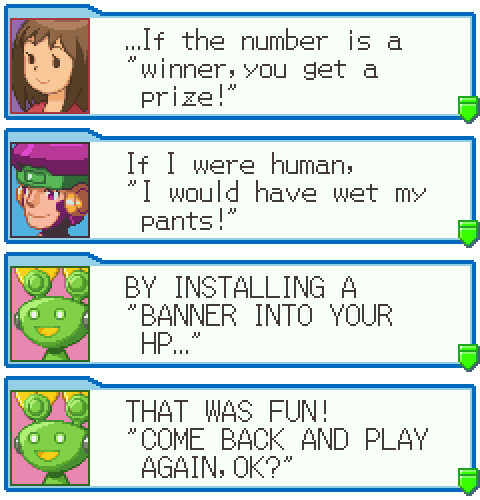
On a handful of occasions, there are nonsensical quotation marks around two lines of a message. My theory is that this is, in some way or another, an Excel thing: a linebreak was added to the cell itself instead of the second line being in its own cell. So when the text was copied from Excel, it would get put within quotes to "contain" that internal linebreak.

It's a memorable quirk of the original translation, but it's hard for me to say why "viruses" incorrectly replaces "virus" so much. I think I've seen people assume it was some kind of find-replace gone wrong, but it's not like "virus" never appears, and some incorrect uses of "viruses" even coexist in the same archive with singular "virus."
My best guess is that it may be related to the translators working in some kind of terms-based translation system like MemoQ, in which "viruses" was the defined translation for the term ウイルス. This could have caused the plural to be included more frequently despite the grammar not matching; alternatively, perhaps someone would just see "term missing" (because the translation included "virus" but not "viruses") and change it without thinking.
That may be a bit of a stretch, but the "terms-based" part at least seems like a fair assumption. It would certainly explain things like the consistent use of abbreviated terms when not necessary, or the weird inclusion of terms in the wrong context, like the word "Emotion" being capitalized in regular dialogue because there's a story-data item called that.

Continuing along those lines: The above text is fairly obscure (a Navi on the Net after the AquaMan flood, but before the match), so even some reasonably thorough testing might not have caught it. But this line was almost certainly a result of it exactly matching the Japanese name of the AntiWatr chip, which literally translates to "big flood." And honestly, with the zero context available, it's not totally unreasonable to assume this Navi is talking in a NetBattle context.

Similarly, the "waiting rooms" for the tournament venues sometimes got translated as "WaitingRoom," ala the aforementioned Navi-dispatch system, because it's just the same word presented the same way in Japanese. There's little context in the text itself to know for sure the former isn't the latter - at best, you could see the mention of the WaitingRoom in Higsby's shop, but who knows if the people who translated lines like this even had access to the information required to piece it together.

It's The Famous. This line had no indication of the person's gender or name, nor any useful context close by in the linear script data, which is mainly just Mom's lines as an NPC. So my two leading theories are that they assumed male at first, it was caught (which may be quite an assumption given all that wasn't), but they somehow only half-corrected... or the translator went for the gambit of making it obviously wrong so that someone would catch it and go with whichever was correct. Which obviously didn't happen. (And option 3 is just "decided to assume male but made a typo.")

A small but amusing mistake: Some of the link-making Mr. Progs on various home pages call the banner links "synthetic links." This was a misreading of "sougo," mutual, as "sougou," synthesis.
(The "A" here is the start of the next sentence in the following textbox, not a mistake. But man, talk about a demonstration of how goofy the textbox splits can get.)

Lastly, something that's kind of interesting and really funny. During the AquaMan flood, there are a handful of lines spoken underwater where every syllable comes out as starting with a "b" sound, with what was actually said being shown in parentheses. However, only the scene pictured above (if MegaMan goes on the Net without getting the oxygen tank) was handled correctly, as the context is provided by the scene; it's also the least obscure.
The other two instances of this came out... different.
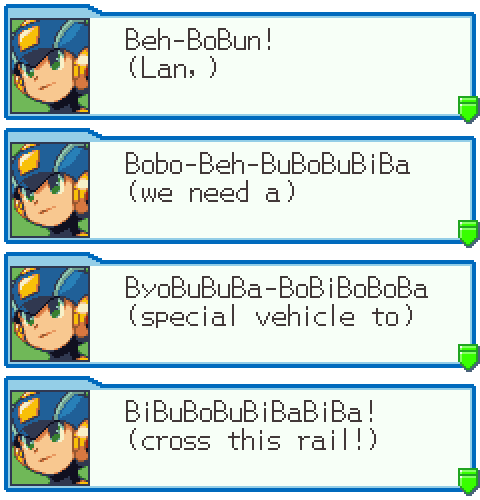
This one decided to basically transcribe the Japanese literally (aside from changing a string of three "bo"s in a row for "o to-o-(ru)" to just one), assuming it was gibberish. The Japanese line it's based on, if you'd care to follow along, is: "Netto-kun! Kono reeru o tooru ni wa tokushu na norimono ga hitsuyou mitai da!"
As for the last instance...
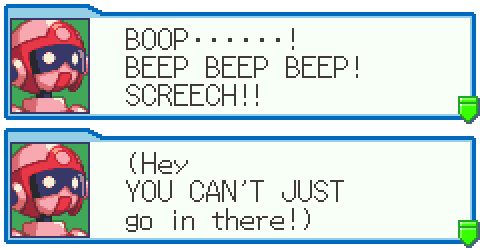
Ah, the wonders of language.